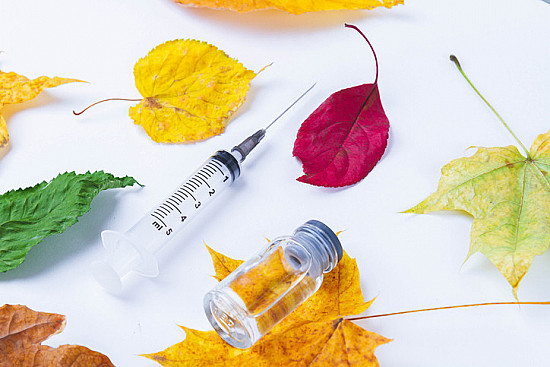
The fall calendar doesn’t just warn us of impending cold temperatures: It also points toward seasonal upticks in cases of RSV (respiratory syncytial virus), COVID, and influenza. These respiratory viruses were dubbed a “tripledemic” last year. After they collided to overload health care systems across the country, hospitalizations rose in tandem for all three illnesses over the fall and winter months.
Warding off severe cases — which may lead to hospitalization or death — should be top of mind, especially for those who are most vulnerable, a Harvard expert says. And updated versions of all three vaccines are now available to help protect us.
Why do cases of flu, RSV, and COVID typically rise in fall?
“This is typically the time of year we start to see viral infections increase, which has a lot to do with kids going back to school,” says Dr. John Ross, an assistant professor of medicine at Harvard Medical School who is board-certified in infectious diseases.
“Also, we’re starting now to have weather that’s more favorable for viral transmission, particularly lower humidity. Viruses survive better in dry air. And drier air also affects our airways and makes them more vulnerable to being infected.”
Who is eligible for each shot?
Eligibility recommendations vary by age and vulnerability to serious illnesses. Additionally, some shots are designed to help protect specific groups against serious illness.
The CDC recommends these shots for the following groups.
RSV
- Babies under 8 months and older infants at risk of severe RSV: A new shot, nirsevimab (Beyfortus), provides antibodies that protect against RSV for about five months.
- If you’re pregnant: One vaccine (Abrysvo) is approved at 32 weeks to 36 weeks of pregnancy. Having this shot during pregnancy protects infants during the first six months of life.
- If you’re over 60: Two vaccines (Arexvy and Abrysvo) are approved. Ask your health provider if you should consider getting one.
COVID
- Everyone 6 months and older should consider getting one of the updated COVID boosters, which were approved and authorized for emergency use by the FDA in early September.
- Age 5 and older: Regardless of prior vaccination, children and adults are eligible for one dose of an updated mRNA vaccine if it’s been at least two months since their last COVID vaccine, the FDA says.
Flu
Who is likely to benefit most?
Getting the right vaccines can help people avoid missed work or school days and running the risk of making others sick. And the protection offered by these shots is especially important for certain groups.
For all three viruses, the people most vulnerable to severe illness are similar, Dr. Ross says, including
- adults 65 and older
- those with compromised immune systems or underlying lung conditions such as COPD and asthma
- those who are pregnant.
“Certainly with COVID and flu, pregnancy outcomes are worse with those infections,” Dr. Ross says. “I’m not saying that RSV isn’t a risk for pregnant mothers, but there’s not much data. The reason pregnant women are offered RSV vaccination is so the maternal antibodies they produce protect the newborns, because they’re at very high risk for RSV with very bad outcomes.”
Additionally, an even wider range of people are more prone to complications from the flu, according to the CDC. This includes
- infants under 2
- people with heart disease, neurologic conditions, blood disorders, endocrine disorders such as diabetes, obesity, kidney disease, liver or metabolic disorders
- people who have had a stroke.
What else should you know about flu, COVID, and RSV shots?
Beyond broad guidance determining who’s eligible for each type of vaccine, Dr. Ross offers other useful insight that may guide your choices.
When is the best time to get a flu shot?
The CDC recommends getting a flu shot in September or October, and Dr. Ross agrees. “These are usually the months the flu vaccine becomes available and vaccine clinics are easiest to find,” he says. “My personal approach is just to get the vaccine when it’s available, so you don’t forget.”
Will the updated COVID vaccines protect against newer strains of the virus?
The latest mRNA shots by drugmakers Pfizer and Moderna are monovalent, meaning they protect against one variant — XBB.1.5, the most recent to descend from Omicron earlier in 2023. Though that strain is no longer dominant, the boosters should still guard against closely related subvariants that are now circulating, Dr. Ross says. “People can feel comfortable about their protection regardless,” he says.
What else should I know about RSV shots?
The version meant for infants, Beyfortus, isn’t a vaccine at all. It’s a monoclonal antibody product that directly delivers antibodies that protect babies for the duration of a single fall-winter RSV season. These antibodies can prevent RSV or lessen its severity.
Dr. Ross says adults over 60 considering RSV vaccination should be aware of the potential for two rare but potentially serious side effects of the nervous system: the autoimmune conditions Guillain-Barre syndrome and acute disseminated encephalomyelitis, or ADEM. Guillain-Barre can lead to bodywide paralysis, while ADEM can cause weakness and seizures. The risk of these side effects after RSV vaccination in adults is about one in 7,000 — far higher than occurs after flu vaccination, Dr. Ross notes.
“If you’re a totally healthy 60-year-old, I’m not sure it makes sense to get the RSV vaccine,” he says. “It’s a conversation you should have with your doctor.”
